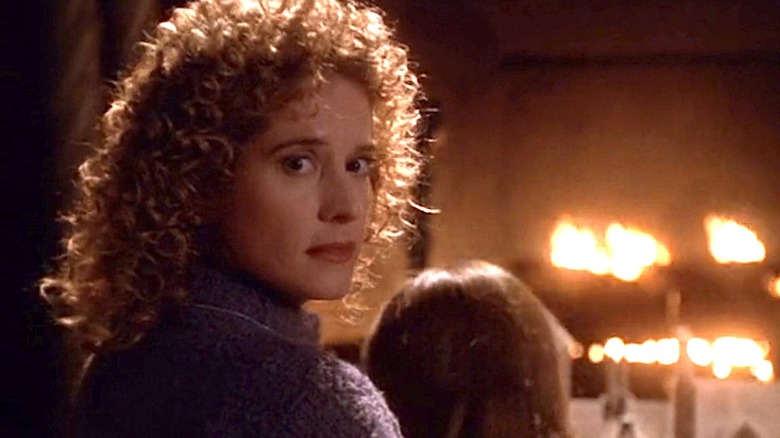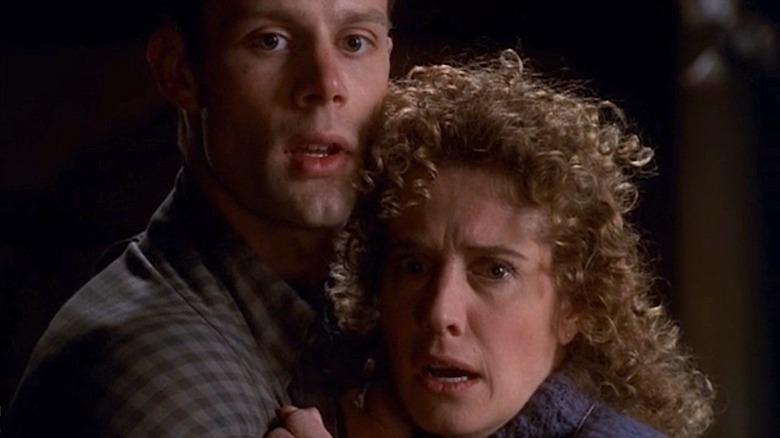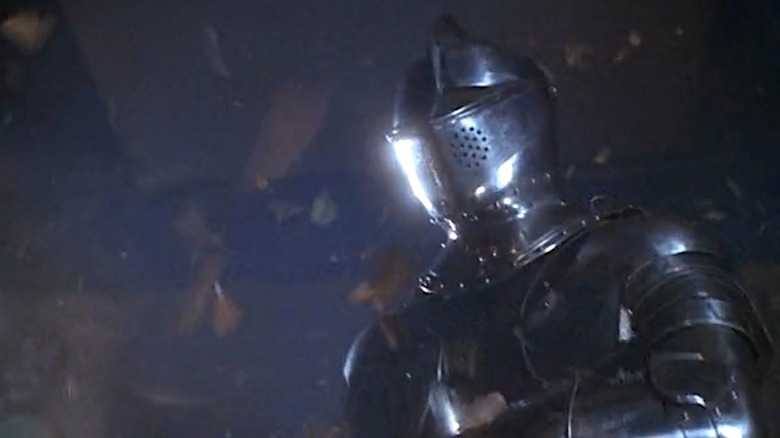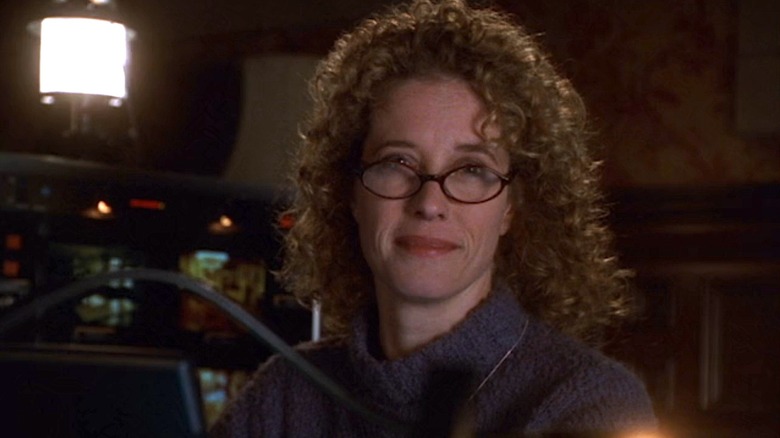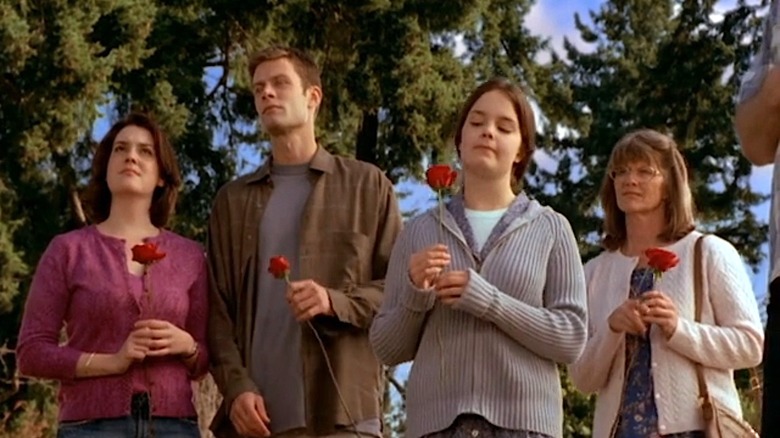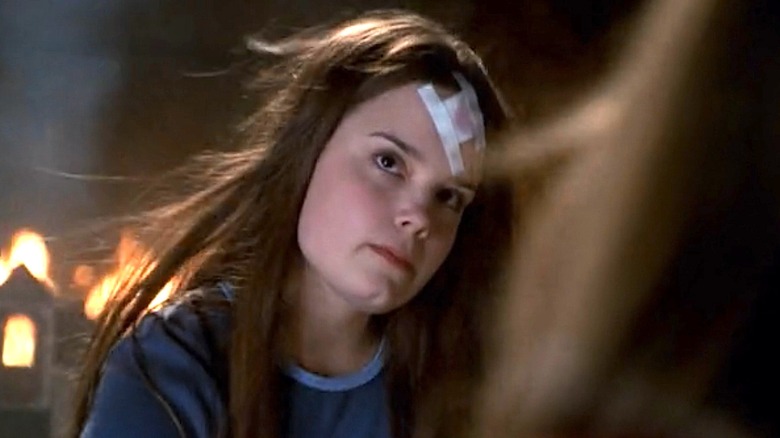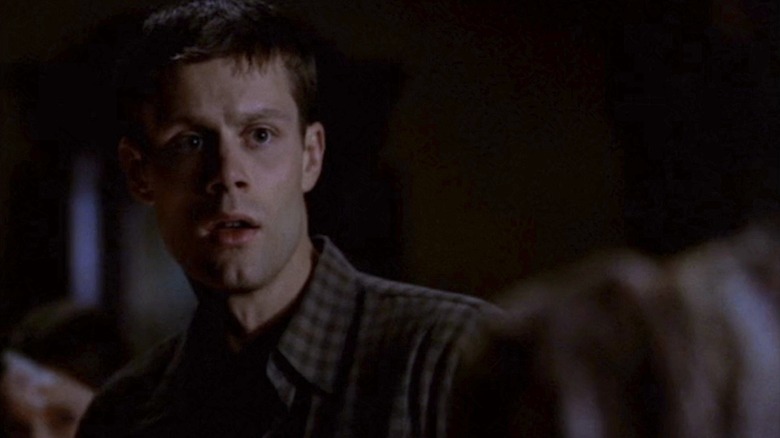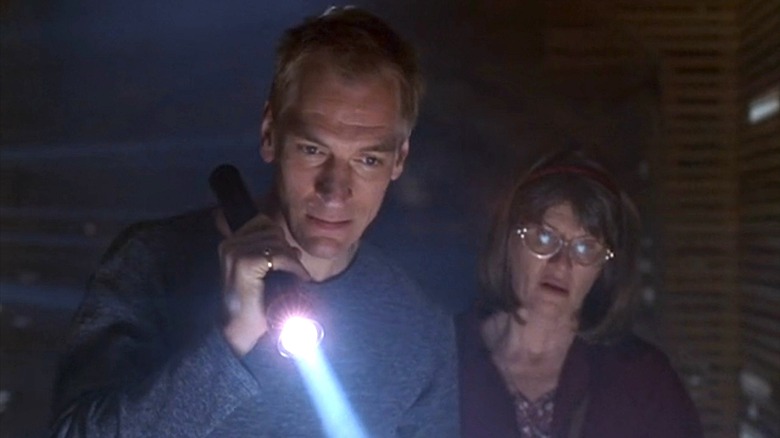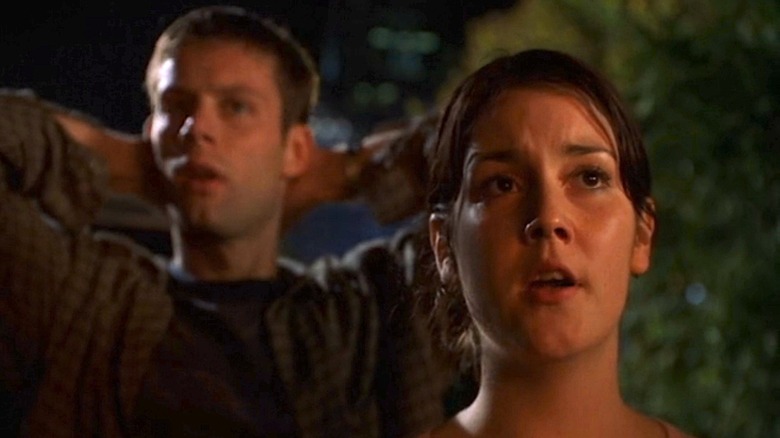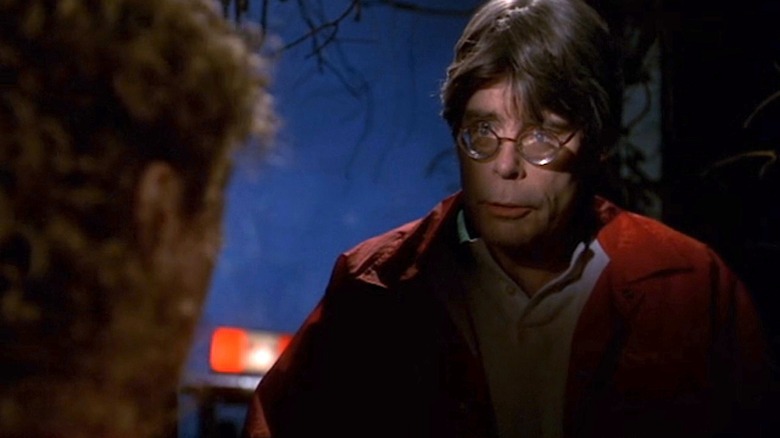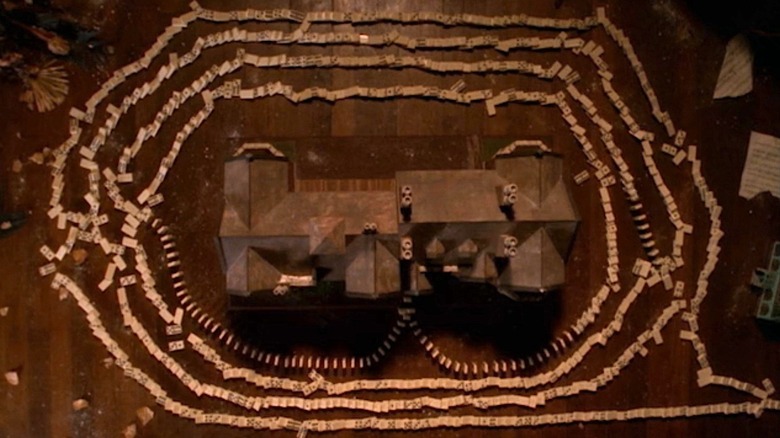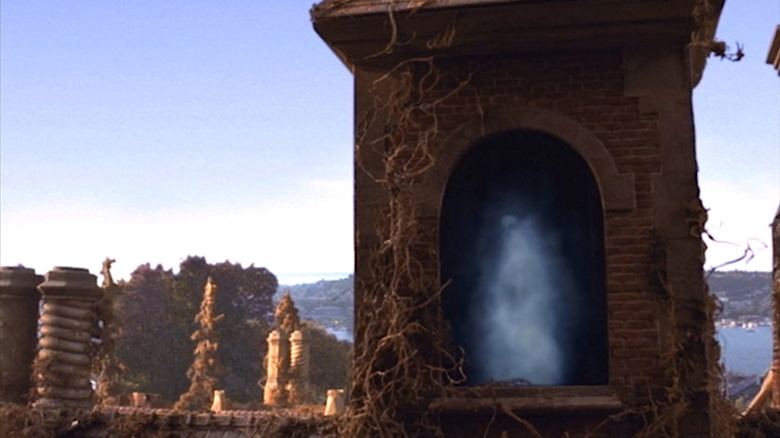The Ending Of Stephen King's Rose Red Explained
Stephen King's "Rose Red" is a 2002 miniseries about a hungry, hungry haunted house — and the paranormal investigators determined to survive snacktime. Of course, survival isn't on the table for all the tasty psychic morsels Dr. Joyce Reardon (Nancy Travis) has gathered to help her wake Rose Red. Joyce is obsessed with scientifically proving the Gilded Age Seattle mansion with a past is actually haunted.
With her tenure at stake and her reputation on the line, Joyce doesn't care if she has to feed Rose Red a psychic or two to get her proof. And with a cast stacked with delicious actors like Julian Sands, Melanie Lynskey, and Emily Deschanel, Joyce really has options. Of course, Joyce quickly gets in over her haunted head. Meanwhile, other members of her party get pulled into mirrors, shape-shifting rooms, and eldritch gardens.
"Rose Red" started its life as a possible collaboration between Stephen King and Steven Spielberg and ended as a TV miniseries with a literally explosive ending. The miniseries was a viewings smash upon its debut and still holds appeal with audiences today. Join us as we prowl around the grounds of this spooky season staple. Watch out for living statues, and read on for the ending of Stephen King's "Rose Red" explained.
What you need to remember about the plot of Stephen King's Rose Red
Dr. Joyce Reardon is a hotshot parapsychology professor, much to the chagrin of her nemesis and department chair, Dr. Carl Miller (David Dukes). Joyce thinks she can finally shake off Miller's nagging (and gain parapsychology superstardom for herself) by leading a ragtag gang of psychics into one last investigation of Seattle's supposedly haunted mansion, Rose Red.
Rose Red was built in 1906 by oil tycoon John P. Rimbauer (John Procaccino) for his wife, Ellen Rimbauer (Julia Campbell). Legend has it that many men — including Rimbauer — have mysteriously died there, and many women have disappeared within the walls. Those walls apparently keep shifting, changing, and growing — even though Rose Red has been abandoned for decades. Joyce is an expert on the Rimbauers, and she's conveniently dating the last in their bloodline: her student, Steve Rimbauer (Matt Keeslar), who isn't a psychic, but is smitten enough to let Joyce into Rose Red before it gets demolished and turned into condos.
Joyce tries to agitate Rose Red to its full power by giving it the psychic alley-oop from her party — especially from young Annie Wheaton (Kimberly J. Brown). Annie is a misunderstood autistic teenager, as well as a powerful psychic. Annie's psychic energy allows Rose Red to bloom into its full wicked capabilities, and soon the psychic investigators are taunted, haunted, and hunted by the house. But the bond between Steve and Annie helps save the day for some of the group.
What happened at the end of Stephen King's Rose Red?
By the third and final episode of "Rose Red," the mansion is in full-on attack mode against the psychic funky bunch. Still, Joyce refuses to leave. Touch-psychic Pam (Emily Deschanel), precognate Vic (Kevin Tighe), Miller, and Miller's lackey, reporter Kevin Bollinger (Jimmi Simpson), are dead. Remote-viewing psychic Nick (Julian Sands) sacrifices himself to the house to save automatic writer Cathy (Judith Ivey), who sees a vision of John Rimbauer's death. He was killed by the wife he abused, Ellen, and her implied lover, the housemaid Sukeena (Tsidii Leloka).
Meanwhile, Annie gets hurt trying to look at a dollhouse version of Rose Red. Rose Red's windows and doors open while Annie is passed out, but they seal when she awakens. Manchild psychic Emery (Matt Ross) realizes Annie's power is being used by Rose Red to keep them trapped, and he tries to kill her so they can get free. Annie scares Emery off by telekinetically attacking him with a suit of armor.
Meanwhile, Steve's childhood memories of Rose Red reveal that he escaped being trapped by Ellen Rimbauer before, by refusing her hammer and her request to stay and help her build. Steve and Annie develop a telepathic connection, and Steve uses it to speak through Cathy's automatic writing to access Annie's "high place" thoughts — and to get her to unseal the doors. Annie breaks free of the house and rains stones down upon it. Annie, Steve, Rachel (Melanie Lynskey), Emery, and Cathy work together to flee — but Joyce stays behind.
What happens to Joyce at the end of Stephen King's Rose Red?
Dr. Joyce Reardon is megalomaniacal, she's manipulative, and she's a total mad scientist who gets her just deserts for trying to sacrifice a bunch of psychics to Rose Red. While Joyce initially rejects Steve's automatic writing plan because of the danger it poses to Annie and Cathy by letting the powers of Rose Red into their deepest psyches, it soon becomes clear that Joyce really just doesn't want that power destroying the house.
Rose Red is Joyce's obsession, the subject of all her research, and her ticket to the top of academia and a whole new level of recognition for the field of parapsychology. If Annie destroys Rose Red, she also destroys Joyce's work — which is more important to her than anyone else's life, even Annie's.
Joyce attacks Annie with a screwdriver, but Steve stops her. He tells her it's time to go, but she insists she has so many things to do — even while the house lightly explodes around her. While the others escape, Joyce is surrounded by all the victims of the house, including Dr. Miller. They welcome her home. Joyce screams as she becomes a ghost, and at the very end of "Rose Red," her ghost is in the tower, right next to Sukeena's and Ellen Rimbauer's. Joyce does not look happy about it. She is living — er, undead — proof that academia can really kill you, if you let it.
What does the end of Stephen King's Rose Red mean?
Houses can go insane, just like people can — and being trapped in such a house is a fate worse than death. In "Rose Red," obsession and weak wills are the primary factors that can drive a person as mad as a house — along with dedication to pursuits like revenge or the glory of being the superstar parapsychologist professor who scientifically proves ghosts exist.
Ellen Rimbauer supposedly kept building additions to Rose Red when she was alive because she thought doing so would grant her eternal life. She was considered "mad" for this in the span of her actual life, but the end of "Rose Red" proves that Ellen was darn right. Even in the final scene, when Rose Red is mere months from demolition, Ellen, Sukeena, and now Joyce seem ready to keep building, to the bitter end. While the ghosts give the concept of "building" a bitter taste, the idea of building new and better lives still holds promise for the survivors of Rose Red.
Annie and Rachel seem to be out from under the thumb of their isolating and abusive dad. Steve and Rachel seem to have a healthy relationship going on, and Annie has a close (non-psychic) bond with Steve. Cathy has the group, and Emery has some independence — and apparently a fondness for Annie, the girl he once tried to goad a roomful of adults into killing. Sometimes, building is the essence of growth. And sometimes, it's proof you're trapped forever in a haunted house of your own making.
Why is everyone so obsessed with Annie?
Young Annie is the supposed key to Joyce's investigation and activation of Rose Red. She is also the focus of Rose Red's obsession — but not one the house tries to kill in one of the more creative ways it reserves for other victims. So what makes Annie so special to both the house and to Joyce?
Ellen Rimbauer is able to speak through Annie. She, and the house, have their powers amplified through Annie's presence. At first, Annie seems to welcome Rose Red. In the opening scene of the miniseries, Annie stages a psychic rock attack on her nasty neighbors, and this as well as her parents' poor treatment of her shows that Annie's powers are wasted and frustrated. At Rose Red, Annie's powers literally bloom. Rose Red deceives Annie into thinking it's her "summer place," just like her favorite song.
The garden of Rose Red comes alive in Annie's presence — but so do the murderous and hungry ghosts. Just like Joyce, Ellen Rimbauer wants to use Annie for her own purposes. Much like Annie's parents, Ellen and Joyce aren't really concerned with Annie's desires or experiences. That's why Annie's ability to test her powers but wrest them away from Ellen and Joyce at the end of "Rose Red" is so satisfying. Her renewed bond with Rachel and Steve also shows that Annie is her own person. By the end of "Rose Red," Annie has found her true "summer place" — being good with herself, her sister, and Steve, and knowing she is neither a problem or a pawn.
Why does Rose Red want Steve so badly?
Steve's psychic ability is awakened both by Rose Red (a home from his family line) and his connection with super-psychic Annie. His link to Annie is instrumental in bringing the house down in the end, but why does he want to? And why does Rose Red so desperately want Steve to "come home" and help it build?
Ellen Rimbauer almost got Steve once. Back when he was being dragged along to Rose Red by his mom as she looked for items to steal and pawn, the most broke of the Rimbauer line had some key childhood encounters with the ghost of Ellen Rimbauer. Even though most men get killed by Rose Red, it seems the house had a fondness for young Steve and is so glad he's back now. But why?
At the risk of sounding simplistic, Steve's a good dude. He is humble, sweet, and just smart enough to know something is up with the house but not smart enough to immediately catch onto how badly Joyce is using him for it. Steve is the embodiment of frustrated potential. Rose Red has a soft spot for that, and many of the women it claims are in similar situations. Steve's tenderness is why the house has always wanted him — and why it doesn't get him in the end, because he uses his heart to help Annie and save the members of the psychic team still left standing.
What happened to Nick?
Nick Hardaway is another male outlier in Rose Red's gaping maw of destruction. Was the sweet yet snarky British MVP psychic really killed by Rose Red? Or did the skeleton creature that snatched him up have bigger things in mind for Nick's undead future?
Though Nick is ultimately quite cavalier about tying up Emery's overbearing mother (Laura Kenny) when she is driven mad by the ghosts, one gets the sense he's only so blasé because he has seen some serious ghost action before. Nick seems to truly have lived a wild psychic life, and by the end of "Rose Red," it's clear we are only getting a small sliver of his story.
Perhaps because Nick pushed the overwhelmed Cathy to safety when he realized the skeleton ghost rucking up the carpet would be satisfied with just one victim, Rose Red took pity on him. Perhaps Nick's multitalented psychic abilities make him more useful to the house as a builder, not just another dead body. Perhaps Nick's death scene is just inappropriately dissatisfying for the understated but excellent performance Julian Sands gives in the miniseries.
Who is really haunting Rose Red?
"Rose Red" relies on a lot of backstory, and the end reveals the truth of the murder behind one of the mansion's key hauntings. But is John P. Rimbauer's murder and his betrayal of Ellen Rimbauer the real reason the house eats people? Or keeps them sort of alive in order to keep building?
In short, no. The Rimbauers may be the architects of Rose Red past and present, but they aren't the only ghost game in town. The tie-in prequel novel, Ridley Pearson's "The Diary of Ellen Rimbauer," alludes to the fact that Rose Red was built on a stolen Native American burial ground and that some of its initial builders died in grisly ways. This could certainly contribute to the haunting of Rose Red, but none of this is clarified by the end of the miniseries.
What is clarified in the original 2002 "Rose Red" trailer, however, is that "If some houses are born bad, this one was created in hell!" This makes the point of who haunts the house a bit moot. "Rose Red" is just a house that doesn't have good bones — only evil ones. And of course, Stephen King himself as a local pizza delivery guy.
What has Stephen King said about the ending of Rose Red?
Stephen King, writer and executive producer of "Rose Red," wasn't entirely thrilled with the final product. "I was in a lot of pain, but I thought I'd love to do an homage to Shirley Jackson," he told The New York Times in a retrospective interview. "It didn't have the bang that 'Storm of the Century' did," he continued. "Some of the acting was a bit ... well, maybe it was the writing." The writing, even if King is now critical of it, contains plenty of his own hallmarks.
"The message that I try to send in all these things is that nobody's really safe," Stephen King says in "The Making of Stephen King's Rose Red" featurette, then adding: "Let's put it this way. Not all the good people make it through." While this message is true of most of King's work, it has added significance considering "Rose Red" is one of King's first projects completed after recovering from being struck by a car while walking in Maine in 1999.
Actor David Dukes sadly did not "make it through" making "Rose Red," as he died of a heart attack on a day off from shooting the miniseries. Dukes, who was only 55, was a renowned character actor. Some may recognize him as Mr. McPhee from "Dawson's Creek." Every episode of "Rose Red" is dedicated to his memory.
Is the ending of Stephen King's Rose Red based on anything?
You can bet your rain of stones on a mystery mansion, it is. "Rose Red" is heavily inspired by Shirley Jackson's novel "The Haunting of Hill House" — which features a rain of stones that also makes an appearance at the beginning and the end of "Rose Red." The miniseries also draws on the 1963 film adaptation of Jackson's novel, "The Haunting."
Fans of Jackson's work won't be able to help seeing her influence in every frame of "Rose Red," from the lush but forbidding atmosphere to the paranoid nature of the not-so-merry band, and of course, the cursed desire to root out the source of great and terrible mysteries. Viewers may also see similarities between aspects of "Rose Red" and frequent King director Mike Flanagan's take on Jackson, "The Haunting of Hill House."
Rose Red itself is also clearly inspired by the real-life Winchester "Mystery" House — built by Sarah Winchester, the widow of the gunmaker William Wirt Winchester's firearms empire. While the official Winchester Mystery House website only lists the mysteries attached to the San Jose mansion and confirms none, legend has it that after her husband's death, Winchester saw a psychic and grew concerned the spirits of those killed by her husband's weapons would haunt her and the psychic advised her that she would only be haunted if she stopped building. So Winchester never stopped — just like Ellen Rimbauer.
What the end of Rose Red could mean for a possible franchise
While it's hard to believe "Rose Red" could have spurred a franchise, it sort of did. Though reviews were mixed across the board for "Rose Red," the miniseries was hugely popular with viewers. The production was rich, the marketing was intense, and this was 2002 — if you wanted to watch (or create) event television that everyone would talk about, forget binging. A drawn-out miniseries was the way.
A tie-in promotional novel inspired a prequel TV movie that came out in 2003, called "The Diary of Ellen Rimbauer." The novel was credited to Ellen Rimbauer and Dr. Joyce Reardon, but rumors flew that King had penned the prequel story himself. Excitement about a new King book added to the hype for the TV movie — but King didn't write the book. Ridley Pearson did.
"Rose Red" itself references other King characters and material. Many repeating themes and doubles are common across King's work. Most obviously, "Rose Red" calls to mind aspects of "The Shining," and even Nick from "The Langoliers." But we're most interested in an eventual Steven Spielberg-Stephen King collaboration. King pitched "Rose Red" to Spielberg first, but the two ultimately couldn't see eye to eye creatively. King made "Rose Red," and Spielberg executive-produced "The Haunting." Now it's time they finally make something together — "Stranger Things" can't have all the fun.
